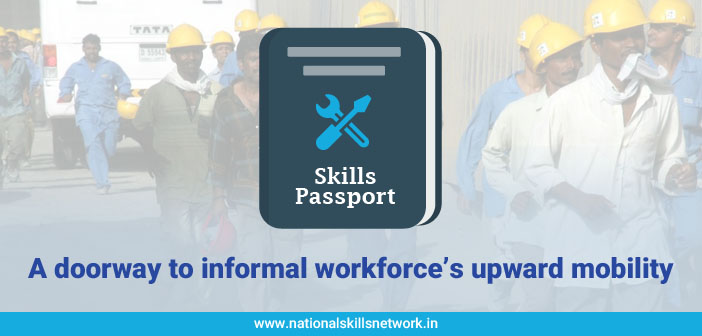Workforce in the informal economy comprises lakhs of migrant workers whose livelihoods depend on their ability to earn a living through their skills. They move around looking for work and all they possess is a pair of hands, legs and a set of tools, without any documented proof of their skills, qualifications and work experience. Even though these workers would have toiled for years and acquired many skills informally or by being trained formally on some occasions, today, there is no systematic way of formally acknowledging their competence. Hence, it is imperative to recognise their skills for portability so that they are eligible for better wages and upward mobility in organized ways.
Skills Passport for informal workforce
A Skills Passport is a document or an online tool that helps informal workers in listing their knowledge, skills and competencies. It is commonly used in the organised or formal sector to help employees create a comprehensive portfolio of skills and qualifications along with references. This helps in finding a job, or training for reskilling and upskilling. When we adapt the concept to Skills Passport to provide an identity to the skills in the unorganized sector, it needs to be conceptualised and implemented to suitably to bridge the gap between the informal and the formal workforce.
 How Skills Passport works
How Skills Passport works
Despite the fact that unorganized sector creates highest number of jobs in India, there is little evidence of workforce profiling that could benefit all the stakeholders – the government, the employers and the training providers. Mobility of workforce from one place to other or from one industry sector to other needs a record of what the workers know and what they can do as per levels of proficiency. It will help them become visible to potential employers and even get exemption from courses or modules already completed.
For example, construction workers may have some technical and generic skills that can help them move across job roles within the industry like masons or painters or even attempt totally different roles in another industry. Or, auto mechanics start their own small/micro enterprise if there is a formal recognition of their skills that could be used for availing a bank loan or attracting more customers. A beautician in a small parlour or a cook in a small dhaba will have better chances of upskilling and higher job roles provided they are able to show an official proof of their knowledge or skills.
Digital inclusion
At the same time, the Skills Passport can be integrated with Aadhaar, PAN (as/when applicable) and Bank Account for seamless linkages and credibility of identity and authenticity of information. This provides a means of digital inclusion and financial inclusion as well, besides scope for updating the skills on a regular basis.
Recognition of Prior Learning (RPL) as a starting point
The main objective of RPL is to recognize informally acquired knowledge and skills through formal assessment and certification. The Skills Passport can be a career guide for the informal workers if their RPL scores and performance are documented as a starting point to provide evidence of their skills.
Job-specific skills for a career
Many workers can build up their repertoire of skills through RPL and short-term training programs. Today, there is no mechanism to consolidate the qualification levels of these workers that can be mapped with career paths in an industry or across industries. With Skills Passport, they have an opportunity to organize their qualifications and strive for career growth.
Ease of mobility and better wages
Migrant workers seldom stick to one kind of a job. They switch jobs as and when opportunity arises. We need to ensure the ease of mobility for these workers without compromising on their work experience and wages. The Skills Passport would help them apply for a range of jobs across states and job roles.
Entrepreneurship and higher learning
Since many skilled workers have the potential to become micro-entrepreneurs, they can be guided and supported through mentoring and funding. If they wish to apply for a MUDRA loan through Pradhan Mantri Mudra Yojna, the Skills Passport can vouch for their professional abilities and achievements.
Acquisition of generic skills
The roster of skills and competencies listed in the Skills Passport can also provide a list of generic skills that the worker has acquired over a period. This includes communication skills, digital skills, and workplace skills in addition to job-specific skills.
The concept of a Skills Passport is highly relevant and necessary to convey aspirational value of skills and ensure that skilled workforce move up the social and economic ladder. It is a basic requirement for acknowledging the existence of informal workforce and working towards sustaining their livelihoods.
Guest Author: Rajesh A R, Chairman and Managing Director, LabourNet Services India Pvt Ltd.













Dear Sir/
I would like to check my digital transcript from Skill passport.
My I know where can access with this.
Your assistance is greatly appreciated.
Regards,
Chiang Tee Hwa
I would really like to contact Rajesh A R, the author of : Skills Passport – A doorway to informal workforce’s upward mobility. The South African situation has almost all the touch points of this brilliant article. I have, over the past 8 years developed a business model and subsequently a mobile/web app that addresses the “Skills Passport” referred to in this article, perhaps there is some synergy in discussing a working relationship?
Kind regard
Sure. Will send a mail to your email id.